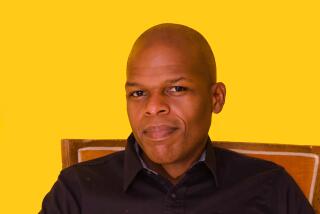Review: In ‘Haints Stay,’ an edgy indie publisher takes on the bloody Old West
In his astonishing portrait of American violence, “Haints Stay,” Colin Winnette makes use of the Western genre to stunning effect. But this isn’t a chummy oater penned by the likes of Zane Grey or Louis L’Amour. Winnette’s frontier feels more Homeric.
“Brooke took the curving blade then and applied it to the neck of yet another man, opening him up like a coin purse and spilling his contents onto the blankets and bundles before him,” Winnette writes early in the novel.
Brooke and Sugar are killers for hire who self-identify as brothers (though the uproar Sugar causes when he disrobes in a bathhouse calls his gender into question). Brooke harbors no doubts about his sibling’s sex, but his views regarding familial relationships can be charitably called misguided:
“The truth was they had plenty of fathers, but that wasn’t what people meant when they said father. They had that kind of father too, the kind that gave Sugar his thick hair and Brooke his crooked nose. There was a single man responsible for the husks of both brothers, only no one knew which man he was or had been and Brooke and Sugar did not care for them to.”
Summer reading guide: The 136 books you’ll want to read
Brooke and Sugar are adept at causing chaos wherever they go, which typically takes the shape of grievous bodily harm for whomever crosses their path. This changes, albeit briefly, when a young boy, naked and afraid, appears in their camp. He can recall little of his origins except for a vague sense that some terrible evil has befallen his family. The killers name him “Bird,” but after a few days in the company of the murderous duo Bird begins to suspect that this terrible evil may very well be Brooke and Sugar.
Winnette’s fifth novel in as many years bears resemblance to Patrick deWitt’s “The Sisters Brothers,” which also features odd but charismatic killers, and both novels owe a debt to Charles Portis’ “True Grit.”
Winnette’s vision is darker, and his knack for tapping into scenes of primal fear and poetic violence serves as an indictment of our species’ base nature and worst instincts. Bloodshed begets bloodshed, but “Haints Stay” lingers on the trauma of the aftermath and explores the unintended consequences of violence. This is especially true when the narrative leaves the brothers behind and follows Bird’s perilous path between the brutal wilderness and what passes for civilization.
A “haint” is a colloquial term for ghost, but perhaps the restless spirit here is the novel’s shifting perspective, which moves from character to character like a vulture flitting from corpse to corpse. When Bird is asked if he believe in ghosts, he replies that he does. “Because it is better to believe in them and never see one than not to believe in them when one decides to set upon you.”
As a countermeasure to all this death and depravity, Winnette introduces a widow, an orphan and a newborn who collectively serve as the best hope for human decency. Although “[s]he did not like killing things,” the widow is determined to protect the baby because “there was always the possibility that [Brooke] was evil incarnate and that the things he was determined to do with that baby would not reward imagining.”
While the novel flouts most of the conventions of the traditional horse opera, the rewards of “Haints Stay” belong to the reader.
Haints Stay
Colin Winnette
Two Dollar Radio: 212 pp., $16 paper
Ruland is the author of “Forest of Fortune.”
MORE FROM BOOKS:
Get ready to be obsessed by these 29 page-turners
27 nonfiction books you’ll want to read -- and share -- this summer
Listen up: Here are 11 audiobooks you’ll want to ‘read’ this summer
More to Read
Sign up for our Book Club newsletter
Get the latest news, events and more from the Los Angeles Times Book Club, and help us get L.A. reading and talking.
You may occasionally receive promotional content from the Los Angeles Times.






